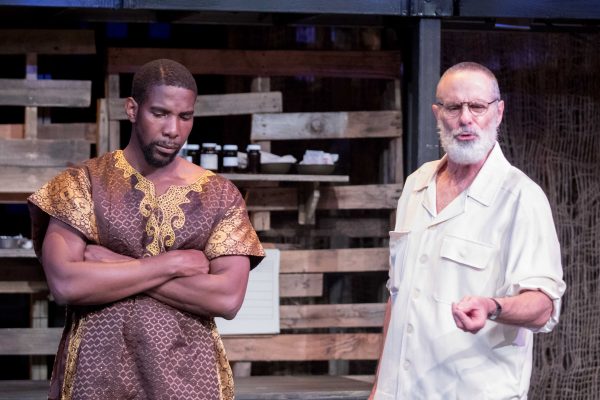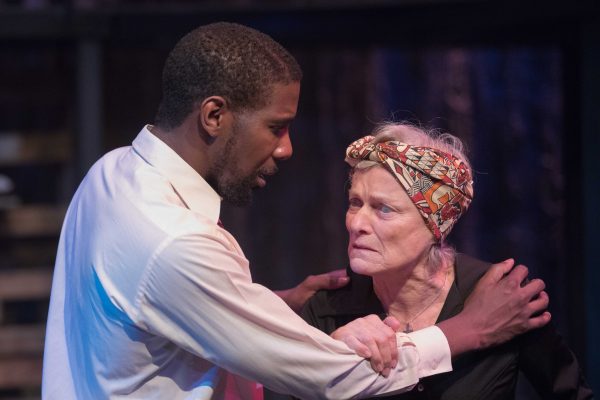It really doesn’t matter that we don’t know exactly when playwright and human rights activist Lorraine Hansberry wrote her play Les Blancs. We know that it was the last play that she wrote before she died at 34, leaving behind several almost finished drafts of Les Blancs that her ex-husband (and executor), Robert Nemiroff, finished based on Hansberry’s drafts and many notes.
What does matter is that she wrote it. Hansberry died in 1965 when America was fermenting with Vietnam War pushback and Martin Luther King’s civil rights activism. We can safely surmise that Les Blancs (The Whites) might have been the first of a different kind of play she was beginning to envision — one that migrated from the home-grown racism that she’d known, fought and written about in such works as A Raisin in the Sun, to the more ancient fundamental evils of colonialism where that racism originated.
Les Blancs — reportedly a response to Jean Genêt’s Les Noirs (The Blacks) — was punished for its belated post-mortem birth. It was produced five years after Hansberry’s death. Its largely unsung Broadway run was brief. So seeing Les Blancs now (a first time for me) in a visceral production dynamically staged by Gregg T. Daniel at Rogue Machine Theatre, one is struck by several things: how far ahead of her time Hansberry was when she wrote this play, how loudly its message still resonates, and how powerful is its construct. And then there is the realization of the magnitude of the loss that her death so young represents. She was only getting started.

[alert type=alert-white ]Please consider making a tax-deductible donation now so we can keep publishing strong creative voices.[/alert]
Les Blancs is based on the early struggles for autonomy and independence of African tribes and populations that had subsisted far too long under the grinding foot of imperial colonialism. The play is set in a carefully observed fictitious African nation at a time when the natives were getting restless. Charlie Morris (Jason McBeth), an American journalist, visits a remote mission in this African wilderness, eager to write about the medical and moral bounty proffered on the native population by these dedicated doctors and one Reverend. What he finds is a lot more complex.
Not only are the natives chafing, but also the white providers of their presumed well-being are growing uneasy. The two doctors on hand, young Marta Gotterling (Fiona Hardingham) and the older Willy DeKoven (Joel Swetow), have made this place their home. You might say out of habit as much as anything else. We never meet the Reverend who is away on a mission, but we do meet his wife, an older Scandinavian woman known as “Madame” (Anne Gee Byrd), who is the enigmatic conscience of the place.
These are the benevolent Blancs, matched by others — such as Major George Rice (Bill Brochtrup), in charge of local “security” — who long ago moved past benevolence into a resentful emotional usurpation of the territory as their own and of its people as incorrigible children perpetually in need of stern discipline.

Charlie’s arrival at The Mission coincides with the death of the beloved local tribal chief. Into this combustible mix enter the chief’s two older sons: the firstborn Abioseh (Matt Orduña), who has turned his life over to the priesthood, and his younger brother Tshembe (Desean Kevin Terry) who has been living a middle class life abroad, married a white English woman and fathered a son. But there is a third brother, Eric (Aric Floyd), quite a bit younger than the other two, and clearly of mixed race. Eric has never left the village.
There is affection and many happy memories shared by all three, but there also are tensions. Tshembe is not happy about Abioseh’s decision to serve Christ. And both brothers are genuinely concerned about the uneducated Eric who’s adrift in more ways than one. Meanwhile, the drumbeats grow louder, the drinks get stiffer, while the tongues wag looser.
No, this is not a Hollywood B movie and Dorothy Lamour is not about to walk in. With the American reporter scratching at every surface, the lauded serenity of the place, whose ownership everyone claims, begins to develop cracks. Relationships are strained, some to the breaking point, with some predictable and unpredictable yet arresting results.

This is not what you’d call a traditional ensemble production. Each character is a distinct individual, yet director Daniel’s fluid staging, with the help of his excellent actors, weaves a tightly knit active tapestry. He manages to make the small Rogue stage feel larger than it is, the pace feel brisker, while the primitive nature of the mostly wooden set by Stephanie Kerley Schwartz (with lighting by Derrick McDaniel) provides the adequate sense of grime and poverty and absence of amenities.
Propelling this piece forward is a shard of anxiety that pulses through the action without fully revealing itself until the final unraveling. The end is clearly the start of something much bigger, much more explosive — something that is at once a cry of liberation and a scream of terror. It is felt keenly in the throbbing of superb percussionist Jelani Blunt’s mounting drumbeat and in the spectacular solo dancing by Shari Gardner, an awakening spirit of Africa if ever there was one, strikingly choreographed by Joyce Guy.
There is a certain amount of overwriting in Les Blancs, and also calculated plotting, both of which are manifestations of the period in which the play was written (or perhaps Nemiroff’s tinkering). We’ll never know. Plays generally were wordier in the 1960s. What saves Les Blancs, however, is the honesty of the writing and the relationships, a few cuts perhaps, and the smooth direction. The modern equivalent that comes closest to it happens to be an impressive play by another incisive writer on a related subject: it is Lynn Nottage’s Ruined, a cri de cœur about other violence and its unremitting provocations in today’s Africa.

This production of Les Blancs deserves to be seen, if for no other reason than its superior quality and unpretentiousness. With any luck, it should be extended. Let’s hope Center Theatre Group also is paying attention and that they might consider it for their next Block Party at the Kirk Douglas (or more…?). It’s a play and production that come late to the party, but that should not be ignored. Hansberry allegedly considered Les Blancs her best writing and, despite its small flaws, you can see why.
Top image: l-r: Matthew Lindberg, Bill Brochtrup, Desean Kevin Terry (foreground) & Jelani Blunt in Les Blancs.
Photos by John Perrin Flynn
WHAT: Les Blancs
WHERE: Rogue Machine at The Met Theater, 1089 N Oxford Ave, Los Angeles, CA 90029.
WHEN: Saturdays & Mondays, 8pm; Sundays, 3pm. Ends July 3, 2017. (No performances on June 16 & 24.)
HOW: Tickets: $40. Reservations: www.roguemachinetheatre.com or at 855-585-5185.
